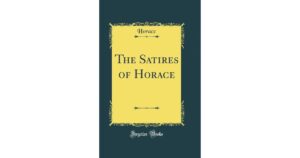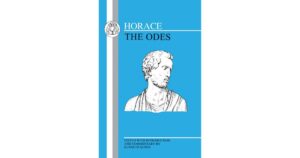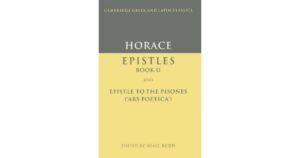Horace and His Important Works| Ars Poetica
Horace (65 BCE – 8 BCE) was a Roman poet, satirist, and literary critic who made significant contributions to literary criticism. His works, particularly “Ars Poetica” (The Art of Poetry), had a profound impact on the development of literary theory and criticism.
Table of Contents

Contributions to Literary Criticism:
- Establishment of Literary Criticism as a Discipline: Horace’s “Ars Poetica” is considered one of the earliest and most influential works of literary criticism. It laid the foundation for literary criticism as a distinct discipline.
- Principles of Good Writing: He outlined essential principles of good writing, including clarity, concision, and decorum. He emphasized the importance of style, tone, and audience consideration.
- The Role of the Poet: He discussed the poet’s role in society, arguing that poets should aim to delight and instruct their audience.
- Critique of Contemporary Literature: He critiqued the literary trends of his time, advocating for a return to classical values and condemning excessive ornamentation.
- Influence on Later Critics: His ideas influenced later literary critics, such as Longinus and Quintilian, shaping the development of literary theory and criticism.
Key Concepts given by Horace:
- Ut pictura poesis (“As is painting, so is poetry”): His famous phrase highlighting the similarities between poetry and visual art.
- Dulce et utile (“Sweet and useful”): Horace’s notion that poetry should be both enjoyable and instructive.
- Decorum (“Appropriateness”): Horace’s emphasis on the importance of suitability and propriety in writing.
His contributions to literary criticism have had a lasting impact on Western literary theory, shaping the way we think about literature, poetry, and the role of the writer.

Important works of Horace:
- Satires (Sermones): A collection of satirical poems, exploring themes like morality, philosophy, and literature.
- Epodes: A collection of short poems, often satirical or lyrical, addressing various subjects.
- Odes (Carmina): A collection of lyrical poems, exploring themes like love, friendship, and philosophy.
- Ars Poetica (The Art of Poetry): A treatise on poetry and literary criticism, offering guidance on writing and style.
- Epistles (Epistulae): A collection of letters in verse, addressing friends, patrons, and fellow writers.
- Carmen Saeculare: A hymn written for the Secular Games, a religious festival in ancient Rome.
Other works include:
- Satires:
- “Satire 1.1”: A critique of greed and materialism.
- “Satire 1.4”: A discussion on the role of the poet.
- Odes:
- “Ode 1.1”: A celebration of poetry and the poet’s role.
- “Ode 3.30”: A meditation on the poet’s legacy.
- Ars Poetica:
- “Ars Poetica 1-41”: A discussion on the importance of style and decorum.
- “Ars Poetica 268-294”: A critique of excessive ornamentation.
- Epistles:
- “Epistle 1.1”: A letter to Maecenas, exploring the role of the poet.
- “Epistle 2.1”: A letter to Augustus, discussing the poet’s relationship with the state.
His works offer valuable insights into ancient Roman culture, literature, and philosophy, and continue to influence literary theory and criticism to this day.

Horace’s Take on Poetry and Drama:
He had a significant impact on the development of poetry and drama, and his ideas continue to influence literary theory and criticism. Here are some key aspects of his take on poetry and drama:
Poetry:
- Purpose of Poetry: Horace believed that poetry should be both enjoyable and instructive (dulce et utile).
- Style and Decorum: He emphasized the importance of style, tone, and decorum in poetry, advocating for a balanced approach between form and content.
- Imitation and Originality: Horace believed that poets should imitate the best models of the past while also striving for originality and innovation.
- Poetic Genres: He recognized various poetic genres, such as epic, lyric, and elegy, and offered guidance on their characteristics and uses.
Drama:
- Tragedy and Comedy: Horace discussed the importance of both tragedy and comedy in drama, highlighting their respective roles in exploring human nature.
- Plot and Character: He emphasized the need for a well-constructed plot and believable characters in drama.
- Style and Language: Horace advocated for a natural, concise, and expressive style in dramatic language.
- Aristotle’s Influence: Horace was influenced by Aristotle’s ideas on drama, particularly the concept of catharsis (emotional purging).

Key Quotes by Horace:
- “Poetry is like painting; some attract by their charm, others by their moral.” (Ars Poetica)
- “The poet’s aim is either to profit or to please, or to do both.” (Ars Poetica)
- “Comedy is a mirror of life, and life is a mirror of comedy.” (Ars Poetica)
Horace’s ideas on poetry and drama continue to shape literary theory and criticism, offering valuable insights into the nature of creative expression and the role of the artist.
Read and learn more: Aristotle and His Important Works| Poetics







One thought on “Horace and His Important Works| Ars Poetica”